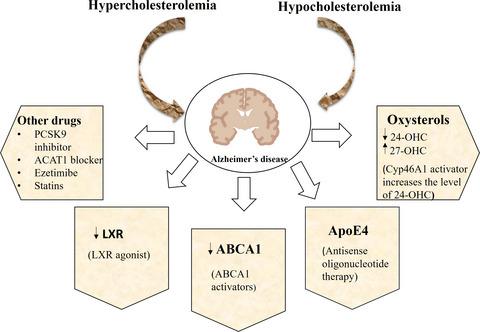当前位置:
X-MOL 学术
›
Eur. J. Neurosci.
›
论文详情
Our official English website, www.x-mol.net, welcomes your feedback! (Note: you will need to create a separate account there.)
Novel therapeutic strategies for Alzheimer’s disease targeting brain cholesterol homeostasis
European Journal of Neuroscience ( IF 3.698 ) Pub Date : 2020-08-27 , DOI: 10.1111/ejn.14949 Nikita Patil Samant 1 , Girdhari Lal Gupta 1
European Journal of Neuroscience ( IF 3.698 ) Pub Date : 2020-08-27 , DOI: 10.1111/ejn.14949 Nikita Patil Samant 1 , Girdhari Lal Gupta 1
Affiliation

|
Alzheimer's disease (AD) is a progressive neurodegenerative disorder and the most common cause of dementia. Aβ plaques and tauopathy are two major concerns associated with AD. Moreover, excessive Aβ accumulation can lead to other nonspecific metabolic brain abnormalities. There are various genetic, environmental, and other risk factors associated with AD. Identification of risk factors and its mechanisms by which these factors impart role in AD pathology would be helpful for the prevention of AD progression. Altered cholesterol homeostasis could be considered as a risk factor for AD progression. Brain cholesterol dysmetabolism is recognized as one of the crucial attributes for AD that affect major hallmarks of AD including neurodegeneration. To fill the gap between altered cholesterol levels in the brain and AD, the researchers started focusing on statins as re‐purposing drugs for AD treatment. The various other hypothesis has been suggested due to a lack of beneficial results of statins in clinical trials, such as reduced brain cholesterol could underlie poor cognition. Unfortunately, it is still unclear, whether an increase or decrease in brain cholesterol levels responsible for Alzheimer's disease or not. Presently, scientists believed that managing the level of cholesterol in the brain may help as an alternative treatment strategy for AD. In this review, we focused on the therapeutic strategies for AD by targeting brain cholesterol levels.
中文翻译:

针对脑胆固醇稳态的阿尔茨海默氏病的新治疗策略
阿尔茨海默氏病(AD)是一种进行性神经退行性疾病,也是痴呆症的最常见原因。Aβ斑块和tauopathy是与AD相关的两个主要问题。此外,过量的Aβ积累可导致其他非特异性代谢性脑异常。与AD相关的遗传,环境和其他风险因素多种多样。识别风险因素及其通过这些因素在AD病理中发挥作用的机制将有助于预防AD进展。胆固醇稳态的改变可被认为是AD进展的危险因素。脑胆固醇代谢异常被认为是AD的关键属性之一,它会影响AD的主要特征,包括神经变性。为了填补大脑和AD胆固醇水平变化之间的空白,研究人员开始将他汀类药物作为AD治疗的新用途药物。由于在临床试验中他汀类药物缺乏有益的结果,因此提出了其他各种假设,例如脑胆固醇降低可能是不良认知的基础。不幸的是,尚不清楚脑胆固醇水平升高或降低是否与阿尔茨海默氏病有关。目前,科学家认为控制大脑中胆固醇的水平可以作为AD的另一种治疗策略。在这篇综述中,我们集中研究了针对脑胆固醇水平的AD治疗策略。例如降低脑胆固醇可能是不良认知的基础。不幸的是,尚不清楚导致阿尔茨海默氏病的脑胆固醇水平升高还是降低。目前,科学家认为控制大脑中胆固醇的水平可以作为AD的另一种治疗策略。在这篇综述中,我们集中研究了针对脑胆固醇水平的AD治疗策略。例如降低脑胆固醇可能是不良认知的基础。不幸的是,尚不清楚脑胆固醇水平升高或降低是否与阿尔茨海默氏病有关。目前,科学家认为控制大脑中胆固醇的水平可以作为AD的另一种治疗策略。在这篇综述中,我们集中研究了针对脑胆固醇水平的AD治疗策略。
更新日期:2020-08-27
中文翻译:

针对脑胆固醇稳态的阿尔茨海默氏病的新治疗策略
阿尔茨海默氏病(AD)是一种进行性神经退行性疾病,也是痴呆症的最常见原因。Aβ斑块和tauopathy是与AD相关的两个主要问题。此外,过量的Aβ积累可导致其他非特异性代谢性脑异常。与AD相关的遗传,环境和其他风险因素多种多样。识别风险因素及其通过这些因素在AD病理中发挥作用的机制将有助于预防AD进展。胆固醇稳态的改变可被认为是AD进展的危险因素。脑胆固醇代谢异常被认为是AD的关键属性之一,它会影响AD的主要特征,包括神经变性。为了填补大脑和AD胆固醇水平变化之间的空白,研究人员开始将他汀类药物作为AD治疗的新用途药物。由于在临床试验中他汀类药物缺乏有益的结果,因此提出了其他各种假设,例如脑胆固醇降低可能是不良认知的基础。不幸的是,尚不清楚脑胆固醇水平升高或降低是否与阿尔茨海默氏病有关。目前,科学家认为控制大脑中胆固醇的水平可以作为AD的另一种治疗策略。在这篇综述中,我们集中研究了针对脑胆固醇水平的AD治疗策略。例如降低脑胆固醇可能是不良认知的基础。不幸的是,尚不清楚导致阿尔茨海默氏病的脑胆固醇水平升高还是降低。目前,科学家认为控制大脑中胆固醇的水平可以作为AD的另一种治疗策略。在这篇综述中,我们集中研究了针对脑胆固醇水平的AD治疗策略。例如降低脑胆固醇可能是不良认知的基础。不幸的是,尚不清楚脑胆固醇水平升高或降低是否与阿尔茨海默氏病有关。目前,科学家认为控制大脑中胆固醇的水平可以作为AD的另一种治疗策略。在这篇综述中,我们集中研究了针对脑胆固醇水平的AD治疗策略。



























 京公网安备 11010802027423号
京公网安备 11010802027423号